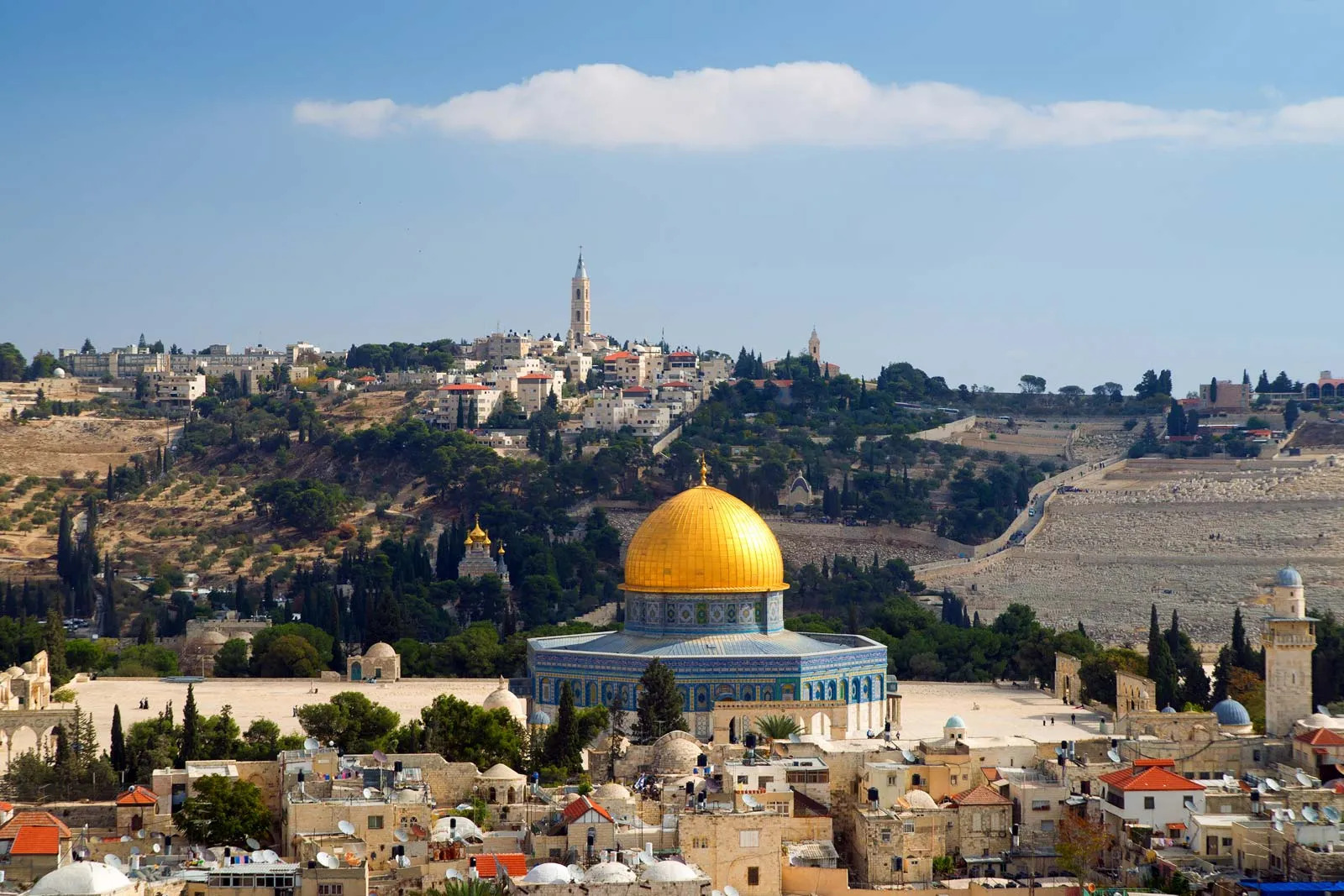
Jerusalem, the eternal capital of Israel, holds a fascinating history and rich cultural heritage that spans thousands of years. This ancient city, located in the Middle East, serves as a significant religious and historical center for Judaism, Christianity, and Islam. With its iconic landmarks, including the Western Wall, the Dome of the Rock, and the Church of the Holy Sepulchre, Jerusalem attracts millions of visitors from around the world each year.
In this article, we will dive into the enchanting world of Jerusalem and unveil 34 intriguing facts about this captivating city. From its historical significance to its vibrant multiculturalism, Jerusalem is a treasure trove of wonders waiting to be explored. So, fasten your seatbelts as we embark on a journey through time and unravel the secrets that make Jerusalem a truly remarkable place.
Key Takeaways:
- Jerusalem, one of the oldest cities, holds deep religious significance for Judaism, Christianity, and Islam, making it a captivating destination for history enthusiasts and pilgrims alike.
- From the iconic Western Wall to the vibrant Mahane Yehuda Market, Jerusalem offers a rich cultural experience, vibrant culinary scene, and breathtaking natural landscapes for visitors to explore and enjoy.
Jerusalem is one of the oldest cities in the world.
With a history dating back over 5,000 years, Jerusalem has witnessed the rise and fall of empires, making it a captivating destination for history enthusiasts.
It is considered a holy city in three major religions.
Jerusalem holds great importance for Judaism, Christianity, and Islam, making it a revered destination for millions of pilgrims every year.
The Old City of Jerusalem is a UNESCO World Heritage Site.
This ancient walled city, home to religious sites like the Western Wall and the Church of the Holy Sepulchre, is recognized for its cultural and historical significance.
Jerusalem has been destroyed and rebuilt multiple times.
Throughout its turbulent past, Jerusalem has been destroyed and rebuilt on several occasions, each time rising from the ashes with renewed vitality.
The Western Wall is one of Judaism’s holiest sites.
Also known as the Wailing Wall, it is a remnant of the ancient Jewish temple and serves as a place of prayer and reflection for Jews from around the world.
The Dome of the Rock is an iconic Islamic landmark.
This stunning golden-domed shrine stands on the Temple Mount and is highly revered in Islam as the place where Prophet Muhammad ascended to heaven.
The Church of the Holy Sepulchre is a significant Christian pilgrimage site.
Located in the Old City, this church holds great religious importance as it is believed to be the site of Jesus’ crucifixion, burial, and resurrection.
Jerusalem has a diverse and vibrant cultural scene.
From art galleries and theaters to music festivals and culinary delights, the city offers a rich cultural experience for locals and visitors alike.
The Israeli parliament, known as the Knesset, is located in Jerusalem.
Since the establishment of the State of Israel in 1948, Jerusalem has served as the country’s capital, reflecting its political significance.
The city is divided into four quarters.
The Old City of Jerusalem is divided into the Jewish Quarter, the Muslim Quarter, the Christian Quarter, and the Armenian Quarter, each with its own distinct character.
Jerusalem is surrounded by beautiful natural landscapes.
From the lush hills of the Judean Mountains to the serene shores of the Dead Sea, the city is blessed with breathtaking scenery.
The Tower of David Museum offers a captivating glimpse into the city’s history.
Located in the ancient Citadel, this museum showcases Jerusalem’s story through interactive exhibits, archaeological artifacts, and panoramic views.
The Mahane Yehuda Market is a bustling hub of flavors and colors.
This vibrant market offers a sensory delight with its fresh produce, aromatic spices, and delicious street food.
The Israel Museum houses a priceless collection of artifacts.
From the Dead Sea Scrolls to works of renowned artists like Marc Chagall, this museum is a treasure trove of cultural heritage.
Yad Vashem is a powerful memorial to the Holocaust.
This museum and memorial complex honors the memory of the six million Jews who perished during the Holocaust, ensuring their stories are never forgotten.
The Jerusalem Light Rail is an efficient mode of transportation.
This modern tram system connects various parts of the city, making it convenient for residents and tourists to explore.
The Mount of Olives offers breathtaking panoramic views.
Standing overlooking the city, this iconic mountain is not only significant in religious contexts but also provides an unforgettable vantage point.
Jerusalem boasts a thriving tech and innovation industry.
The city has become a hub for startups, entrepreneurs, and technology enthusiasts, earning it the nickname “Silicon Wadi.
The Dead Sea Scrolls were discovered near Jerusalem.
In the mid-20th century, these ancient manuscripts were unearthed in the caves of Qumran, shedding light on Jewish history and biblical texts.
The Hebrew University of Jerusalem is renowned for its academic excellence.
Established in 1918, this prestigious institution has produced numerous Nobel laureates and is a center for research and scholarship.
Jerusalem hosts a variety of international events and conferences.
From cultural festivals to diplomatic summits, the city attracts visitors from all over the world for a range of important gatherings.
The Via Dolorosa is a significant pilgrimage route for Christians.
This historic path follows the supposed route that Jesus took on his way to the crucifixion, attracting pilgrims seeking spiritual connections.
The Mount Zion Cemetery is the final resting place of prominent figures.
Located just outside the walls of the Old City, this cemetery holds the tombs of renowned scholars, artists, and leaders.
Jerusalem’s vibrant street art adds flair and creativity to the city.
Murals and graffiti can be found throughout the city, showcasing the artistic talents and expressions of its residents.
The City of David reveals ancient archaeological wonders.
Visitors can explore the ruins and remnants of the ancient city, providing a glimpse into Jerusalem’s early history.
The Garden Tomb is considered a possible site of Jesus’ burial.
Located outside the Old City walls, this peaceful garden offers a serene place for reflection and prayer.
The Jerusalem International Film Festival celebrates cinematic art.
This annual event brings together filmmakers and movie lovers from around the world to showcase exceptional films and promote cultural exchange.
The Jerusalem Biblical Zoo is home to a diverse range of animal species.
With its focus on conservation and education, this zoo offers a unique opportunity to get up close with wildlife from the Bible and beyond.
The Jerusalem Symphony Orchestra delivers captivating musical performances.
Founded in 1936, this esteemed orchestra showcases the talent and passion of local musicians and international guest artists.
The Church of St. Peter in Gallicantu marks the site of Peter’s denial.
According to tradition, this church stands on the place where Peter denied knowing Jesus three times before the crucifixion.
The Al-Aqsa Mosque is the third holiest site in Islam.
Situated on the Temple Mount, it is a revered place of worship that holds immense religious significance for Muslims.
The Israeli Museum of Islamic Art showcases stunning artifacts.
This museum exhibits a vast collection of Islamic artworks, including ceramics, textiles, and jewelry, offering insights into the rich heritage of the Islamic world.
Jerusalem has a vibrant and thriving culinary scene.
From classic Middle Eastern dishes to modern fusion cuisine, the city offers a delightful array of flavors to tantalize every taste bud.
The Tower of David Sound and Light Show is a mesmerizing experience.
This captivating nighttime spectacle uses light projections and sound effects to bring the history of Jerusalem to life, leaving visitors in awe.
These 34 facts about Jerusalem only scratch the surface of this remarkable city. From its ancient walls to its vibrant cultural scene, Jerusalem continues to enchant and inspire people from all walks of life. Whether you’re a religious pilgrim, a history enthusiast, or a cultural explorer, Jerusalem offers an unforgettable journey through time.
Conclusion
In conclusion, Jerusalem is a city rich in history, culture, and significance. From its historical landmarks to its diverse population, Jerusalem offers a unique and captivating experience for visitors. Whether you’re interested in exploring religious sites, delving into ancient history, or simply immersing yourself in the vibrant atmosphere, there is something for everyone in this extraordinary city. With its blend of ancient traditions and modern influences, Jerusalem continues to be a significant destination for tourists from around the world. So, plan your trip to Jerusalem and get ready to embark on a journey that will leave you with lasting memories and a deeper understanding of this remarkable city.
FAQs
1. What is the significance of Jerusalem?
Jerusalem is considered one of the holiest cities in the world for three major religions: Judaism, Christianity, and Islam. It has been the focal point of religious and historical events for centuries.
2. What are some must-visit landmarks in Jerusalem?
Some must-visit landmarks in Jerusalem include the Western Wall, the Dome of the Rock, the Church of the Holy Sepulchre, and the Mount of Olives. Each of these sites holds immense religious and historical significance.
3. Is Jerusalem safe for tourists?
Yes, Jerusalem is generally safe for tourists. However, like any other major city, it is advisable to take normal precautions and stay aware of your surroundings.
4. Can tourists visit religious sites in Jerusalem?
Yes, tourists can visit religious sites in Jerusalem. However, it is important to dress modestly and adhere to any specific rules or customs associated with the respective religious sites.
5. What is the best time to visit Jerusalem?
The best time to visit Jerusalem is during the spring (March-April) and fall (October-November) seasons when the weather is mild and pleasant. Summers can be hot, while winters can be cool and rainy.
Jerusalem's captivating history, religious significance, and cultural vibrancy make it a truly remarkable city. From awe-inspiring parades to unique culinary delights, there's always more to explore in this ancient metropolis. Delve into the wonders of Jerusalem Day celebrations, uncover even more intriguing facts about the city itself, or learn about the surprisingly versatile Jerusalem artichoke. Each topic offers a fascinating glimpse into different aspects of Jerusalem's rich tapestry, promising an enriching journey of discovery for curious readers.
Was this page helpful?
Our commitment to delivering trustworthy and engaging content is at the heart of what we do. Each fact on our site is contributed by real users like you, bringing a wealth of diverse insights and information. To ensure the highest standards of accuracy and reliability, our dedicated editors meticulously review each submission. This process guarantees that the facts we share are not only fascinating but also credible. Trust in our commitment to quality and authenticity as you explore and learn with us.


